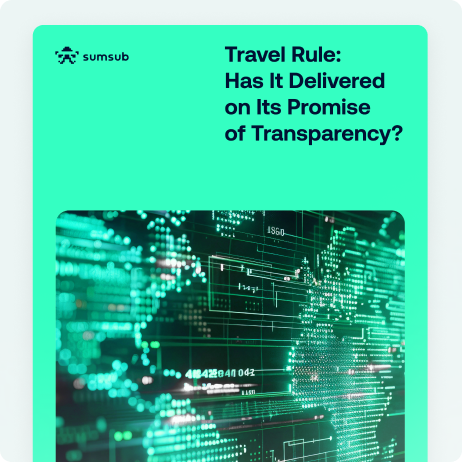- Aug 29, 2025
- 5 min read
Travel Rule in the US: Jurisdictional Requirements for 2025
Explore the Travel Rule in the United States, who needs to comply, what transaction information VASPs need to collect, as well as expert insights on challenges and solutions for compliance
Crypto adoption in the United States is accelerating. As of 2025, nearly one in four American adults (22%) owns virtual assets, up from 20% in 2024. Seeing this growth, regulators are moving quickly to clarify rules for virtual assets and their uses. The GENIUS Act, for example, was signed into law on July 18, 2025, creating the first federal framework for stablecoin issuance. The Treasury Secretary now predicts the US stablecoin market could swell to $2 trillion by 2028, while President Trump signals a pro-crypto stance through initiatives like the creation of a Strategic Bitcoin Reserve and a US digital asset stockpile.
This push reflects a global pattern. The EU, UK, Singapore, and many more countries around the world are implementing clearer standards for virtual assets, with the Travel Rule acting as a cornerstone of both US and international crypto regulation. As more Americans use virtual assets, the industry is also seeing a rise in fraud, with market volatility and a growing user base making it especially attractive to bad actors. This surge in crypto scams has prompted regulators to tighten their stance, making it essential to understand how the Travel Rule works in the US for compliance in the American digital asset ecosystem. Let’s dive into the nuances of the US Travel Rule.
What is the Crypto Travel Rule?
The Travel Rule is a global standard designed to combat money laundering and terrorism financing based on FATF Recommendation 16. It was first introduced in 2019 and requires virtual asset service providers (VASPs) and financial institutions handling virtual asset transfers to collect and share the details of the originator and beneficiary, similar to what has long been required for wire transfers. This ensures data “travels” with the transaction, clarifying who is sending and receiving virtual assets, and making compliance harder to avoid.
Our article on the implementation of the Travel Rule explains its main requirements. However, jurisdictions around the world implement the Travel Rule in different ways, and the United States has its own distinct approach.
Suggested read: Crypto Regulations in the US—A Complete Guide (2025)
Is the Travel Rule enforced in the United States?
Yes. The US regulator FinCEN clarified that existing Bank Secrecy Act (BSA) AML/CFT requirements for transfers applied to convertible virtual currency (CVC) transactions in 2019. The BSA requires VASPs and money services businesses (MSBs) to collect and transmit originator and beneficiary details when they transmit virtual assets for transfers over $3,000. This follows the guidelines of the Travel Rule, albeit with a higher threshold than the FATF recommends.
FinCEN has since issued further guidance to address activities with high risks for money laundering, such as CVC mixing services. In 2025, all VASPs and MSBs operating in or with the US market must comply with FinCEN rules in full, which includes Travel Rule compliance.
What does the Travel Rule require for crypto transactions in the US?
| Requirement | Details |
| Threshold | Transmittals of funds with an equivalent value of $3,000 or more. There has long been discussion to lower this to $250 for transfers entering or leaving the USA. |
| Originator data to be shared | Full name, account number, address, amount of the transmittal order, execution date of the transmittal order. |
| Beneficiary data to be shared | Identity of the financial institution, full name and address, account number, any other specific identifier. |
| Data transmission | The money transmitter must obtain or provide the required regulatory information either before or at the time of the transmittal of value. |
| Record retention | 5 years |
| Reglator | Financial Crimes Enforcement Network (FinCEN) |
| Regulations | 31 CFR § 1010.410(e) and (f)FinCEN Guidelines 2019 |
| Risk-based measures | Conduct due diligence on counterparties and monitor for transactions that pose a higher risk, e.g., from high-risk jurisdictions. |
Who needs to comply with the Travel Rule in the US?
Any financial institution or entity, including VASPs and MSBs, that acts on behalf of a client needs to comply with the Travel Rule in the United States when transaction volume is higher than $3,000.
This includes*:
- Crypto exchanges
- Custodial wallets / wallet providers
- Crypto ATMs
- Trading platforms
- Any US-based company that qualifies as a money transmitter under the BSA when handling CVC transfers
*this list is not exhaustive
Suggested read: The Top 10 Crypto-Friendly Countries (2025)
Penalties for non-compliance with the Travel Rule in the US
Failure to comply with FinCEN rules, including its interpretation of the Crypto Travel Rule, can result in significant penalties, including fines, license revocation, and even criminal charges. FinCEN can assess penalties up to $219,156 for each day of continued willful violation of the BSA.
Notable penalties for violating the BSA:
- Bitcoin mixer Larry Dean Harmon was fined $60 million for violation of the BSA in 2020.
- Crypto exchange Bittrex was hit with two enforcement actions totaling $53 million for willful violations of the BSA in 2022.
- Crypto exchange BitMEX was fined $100 million for violating the BSA by failing to maintain an adequate AML/KYC program.
VASPs and MSBs may also face penalties at a state level, as shown by Paxos’s August 2025 settlement with the state of New York for $48.5 million following failures in due diligence and its AML program.
Expert insight: Common pitfalls in US Travel Rule implementation
VASPs and MSBs face a plethora of potential challenges in implementing the Travel Rule, including mismatched interpretations, incomplete or inconsistent data, non-responsive counterparties, and a lack of interoperability and scope.
Kat Cloud, Head of Government Relations at Sumsub, explains:
The Travel Rule has seen significant divides in how different jurisdictions deal with its implementation and enforcement. Compliance is inconsistent, technology systems are often disconnected, and there’s still some uncertainty about which specific benefits this rule brings to the table… This lack of consistency creates major headaches for businesses that operate across borders… At the same time, huge portions of the crypto ecosystem remain out of scope. Peer-to-peer transfers, non-custodial wallets, and DeFi protocols all fall outside the rule’s jurisdiction because they don’t involve a VASP.
Discrepancies in details may trigger rejections or delays, leading to friction and user frustration. As more jurisdictions are expanding AML/KYC requirements to the crypto ecosystem, this puts VASPs and MSBs in a difficult position.
However, Joe David, founder of Nephos Group and a leading expert in crypto accounting, explains that with more jurisdictions adopting the crypto Travel Rule and with tightening oversight in the United States, compliance is essential:
For years, crypto businesses have navigated a fragmented, inconsistent regulatory environment. But that is changing. 2025 will see a global push toward harmonized compliance standards… Discussions continue [in the United States] over the respective roles of the CFTC and the SEC in regulating the crypto market, with both agencies ramping up enforcement actions against those who fail to comply with regulations.
Suggested read: Protocols in the Travel Rule Solution Explained (2025)
The future of crypto Travel Rule in the US
Updates from FinCEN and the FATF, as well as recent waves of US legislation on virtual asset regulation, indicate a future of stricter compliance, enhanced transparency, and broader international coordination.
FinCEN, for example, has long proposed reducing the de minimis Travel Rule threshold for cross-border CVC transactions from $3,000 to $250, meaning many more transactions could be subject to the Travel Rule in the United States. This proposal, however, is still under consideration, and the discussion is ongoing.
FinCEN generally aligns with the recommendations of the FATF, which continues to revise its guidance on the Travel Rule, and could affect the future of the Travel Rule in the US. For example, by 2030, the FATF recommends clearer responsibilities in the payment chain, standardized information requirements, and the implementation of anti-fraud and error technology for greater transparency and safeguards.
US policymakers are also exploring ways to detect and mitigate illicit finance risks involving digital assets, including the use of AI in AML/CFT and sanctions compliance, as well as blockchain monitoring and the use of digital identity verification in decentralized finance (DeFi) smart contracts. Together, these efforts point to a broader regulatory trend that could expand the scope of the Travel Rule and even see it applied to decentralized applications.
It is also worth remembering that the US operates under a federal system, and while Travel Rule compliance is enforced federally, states can also impose additional requirements for VASPs and MSBs that operate in their jurisdictions.
Entities must comply with both federal Travel Rule obligations and any applicable state-level requirements.
Suggested read: What’s Next for Crypto? 2025 Predictions from the Industry’s Frontlines
How does Sumsub help with Travel Rule compliance in the US?
Sumsub helps VASPs and MSBs operating in the United States to meet evolving FinCEN requirements, including compliance with the Travel Rule. Its user-friendly platform supports the collection, verification, and secure transmission of originator and beneficiary information, which is essential for complying with both US and international regulations.
Our rules automatically check every Travel Rule data exchange transaction, ensuring compliance with both regulatory requirements and your internal policies. This reduces manual work and helps you spot risks early. With the Custom Rules Engine, you can tailor checks to your specific policies, procedures, and risk framework so they fully reflect how your business manages compliance in practice.
Sumsub also offers the widest connectivity on the market, supporting five major Travel Rule protocols along with an email notification tool that ensures full coverage of VASPs, regardless of their location.
FAQ
-
What is the crypto Travel Rule in the US?
Under the US regulator FinCEN, the Travel Rule requires virtual asset service providers (VASPs) and money services businesses (MSBs) to collect, verify, and transmit identifying information about the originator and beneficiary of cryptocurrency transactions above a set threshold ($3,000 in the US). It aligns US regulations with global AML/CFT standards to prevent money laundering and terrorist financing.
-
Who is subject to the Travel Rule in crypto?
The Travel Rule applies to virtual asset service providers (VASPs), including cryptocurrency exchanges, custodial wallet providers, and crypto ATMs, as well as money services businesses (MSBs) that handle virtual assets. Any entity facilitating transfers of virtual assets above the regulatory threshold of $3,000 must comply with the Travel Rule.
-
What are the penalties for not complying with the Travel Rule?
Non-compliance can lead to civil and criminal penalties, including fines and revocation of licenses. Non-compliant firms also risk increased regulatory scrutiny, reputational damage, and restrictions on operations.
-
How does the Travel Rule apply to crypto wallets?
The Travel Rule applies to VASPs and MSBs, not the wallets themselves. When a transaction involves a custodial wallet, the VASP must collect and transmit the required beneficiary and originator information. If only self-hosted wallets are used in the virtual asset transfer, the Travel Rule does not apply.
-
What information must be collected under the Travel Rule?
VASPs in the United States must collect identifying information about both the originator and beneficiary of the transaction. For the originator, this is the full name, account/wallet number (if available), physical address, and the originator’s financial institution, as well as transfer amount and date. For the beneficiary, this is the full name, account/wallet number (if available), physical address (if available), and the beneficiary’s financial institution.
Relevant articles
- Article
- 4 days ago
- 6 min read
What counts as proof of address in the UK? See accepted documents and how to open a bank account if you’ve just moved to the country.

- Article
- 2 weeks ago
- 9 min read

What is Sumsub anyway?
Not everyone loves compliance—but we do. Sumsub helps businesses verify users, prevent fraud, and meet regulatory requirements anywhere in the world, without compromises. From neobanks to mobility apps, we make sure honest users get in, and bad actors stay out.



